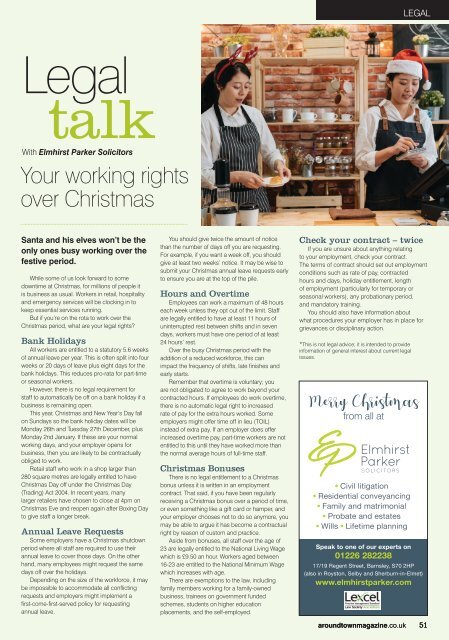Aroundtown Magazine November/December 2022 Edition
The bumper festive edition of Aroundtown Magazine, South Yorkshire's premier free lifestyle magazine
The bumper festive edition of Aroundtown Magazine, South Yorkshire's premier free lifestyle magazine
Create successful ePaper yourself
Turn your PDF publications into a flip-book with our unique Google optimized e-Paper software.
LEGAL<br />
Legal<br />
talk<br />
With Elmhirst Parker Solicitors<br />
Your working rights<br />
over Christmas<br />
Santa and his elves won’t be the<br />
only ones busy working over the<br />
festive period.<br />
While some of us look forward to some<br />
downtime at Christmas, for millions of people it<br />
is business as usual. Workers in retail, hospitality<br />
and emergency services will be clocking in to<br />
keep essential services running.<br />
But if you’re on the rota to work over the<br />
Christmas period, what are your legal rights?<br />
Bank Holidays<br />
All workers are entitled to a statutory 5.6 weeks<br />
of annual leave per year. This is often split into four<br />
weeks or 20 days of leave plus eight days for the<br />
bank holidays. This reduces pro-rata for part-time<br />
or seasonal workers.<br />
However, there is no legal requirement for<br />
staff to automatically be off on a bank holiday if a<br />
business is remaining open.<br />
This year, Christmas and New Year’s Day fall<br />
on Sundays so the bank holiday dates will be<br />
Monday 26th and Tuesday 27th <strong>December</strong>, plus<br />
Monday 2nd January. If these are your normal<br />
working days, and your employer opens for<br />
business, then you are likely to be contractually<br />
obliged to work.<br />
Retail staff who work in a shop larger than<br />
280 square metres are legally entitled to have<br />
Christmas Day off under the Christmas Day<br />
(Trading) Act 2004. In recent years, many<br />
larger retailers have chosen to close at 4pm on<br />
Christmas Eve and reopen again after Boxing Day<br />
to give staff a longer break.<br />
Annual Leave Requests<br />
Some employers have a Christmas shutdown<br />
period where all staff are required to use their<br />
annual leave to cover those days. On the other<br />
hand, many employees might request the same<br />
days off over the holidays.<br />
Depending on the size of the workforce, it may<br />
be impossible to accommodate all conflicting<br />
requests and employers might implement a<br />
first-come-first-served policy for requesting<br />
annual leave.<br />
You should give twice the amount of notice<br />
than the number of days off you are requesting.<br />
For example, if you want a week off, you should<br />
give at least two weeks’ notice. It may be wise to<br />
submit your Christmas annual leave requests early<br />
to ensure you are at the top of the pile.<br />
Hours and Overtime<br />
Employees can work a maximum of 48 hours<br />
each week unless they opt out of the limit. Staff<br />
are legally entitled to have at least 11 hours of<br />
uninterrupted rest between shifts and in seven<br />
days, workers must have one period of at least<br />
24 hours’ rest.<br />
Over the busy Christmas period with the<br />
addition of a reduced workforce, this can<br />
impact the frequency of shifts, late finishes and<br />
early starts.<br />
Remember that overtime is voluntary; you<br />
are not obligated to agree to work beyond your<br />
contracted hours. If employees do work overtime,<br />
there is no automatic legal right to increased<br />
rate of pay for the extra hours worked. Some<br />
employers might offer time off in lieu (TOIL)<br />
instead of extra pay. If an employer does offer<br />
increased overtime pay, part-time workers are not<br />
entitled to this until they have worked more than<br />
the normal average hours of full-time staff.<br />
Christmas Bonuses<br />
There is no legal entitlement to a Christmas<br />
bonus unless it is written in an employment<br />
contract. That said, if you have been regularly<br />
receiving a Christmas bonus over a period of time,<br />
or even something like a gift card or hamper, and<br />
your employer chooses not to do so anymore, you<br />
may be able to argue it has become a contractual<br />
right by reason of custom and practice.<br />
Aside from bonuses, all staff over the age of<br />
23 are legally entitled to the National Living Wage<br />
which is £9.50 an hour. Workers aged between<br />
16-23 are entitled to the National Minimum Wage<br />
which increases with age.<br />
There are exemptions to the law, including<br />
family members working for a family-owned<br />
business, trainees on government funded<br />
schemes, students on higher education<br />
placements, and the self-employed.<br />
Check your contract – twice<br />
If you are unsure about anything relating<br />
to your employment, check your contract.<br />
The terms of contract should set out employment<br />
conditions such as rate of pay, contracted<br />
hours and days, holiday entitlement, length<br />
of employment (particularly for temporary or<br />
seasonal workers), any probationary period,<br />
and mandatory training.<br />
You should also have information about<br />
what procedures your employer has in place for<br />
grievances or disciplinary action.<br />
*This is not legal advice; it is intended to provide<br />
information of general interest about current legal<br />
issues.<br />
• Civil litigation<br />
• Residential conveyancing<br />
• Family and matrimonial<br />
• Probate and estates<br />
• Wills • Lifetime planning<br />
Speak to one of our experts on<br />
01226 282238<br />
17/19 Regent Street, Barnsley, S70 2HP<br />
(also in Royston, Selby and Sherburn-in-Elmet)<br />
www.elmhirstparker.com<br />
aroundtownmagazine.co.uk 51
















